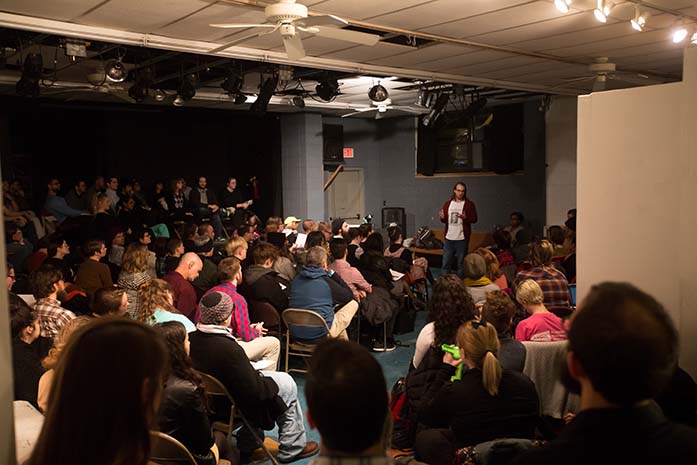Community members join to push for social justice
Iowa Action and Student Engagement held its first meeting to discuss the importance of organizing to foster social progress.
Landon D. C. Elkind speaks about COGS and its funding during the first meeting of the Iowa Action and Student Engagement, in Public Space One in Iowa City, Iowa on Tuesday, Jan. 31, 2017. The Iowa Action and Student Engagement is a newly formed organization aimed at raising awareness and taking action on social issues in Iowa City. (The Daily Iowan/Anthony Vazquez)
February 1, 2017
With President Trump in the White House and Republicans holding a majority in the state Legislature, students and community members gathered to promote social justice and to create change.
Iowa Action and Student Engagement, an organization started by UI student Brad Pector, held its first meeting Tuesday at Public Space One, 120 N. Dubuque St.
“It takes a lot to get your body out of a fixed position in times like these,” Pector said. “…Organizing is difficult, and it requires a lot of self-motivations. Again, in times like these, people need each other to be able to begin to do what we aim to accomplish.”
Local organizer Zarah Roberts focused on measures in the Legislature that “criminalize dissent.” She noted that a proposed bill would make blocking highways with speed limits of 55 mph hour or higher a felony punishable by five years in prison or a $7,500 fine.
“This bill and proposed bills in other states … were designed to instill fear, steal power from the people while giving more to the state, and ultimately to silence us,” she said.
Iowa City resident Brandon Ross said all major successful social movements in the United States only saw success because of protests, such as the Boston Tea Party, which served as a catalyst for the American Revolution.
“The country itself is based on a protest,” he said. “… Almost every single thing in our country that we’ve gotten in our country is from protests.”
While the current political climate and the bills being proposed in Congress and the Legislature was a concern for those in attendance, others believe that the issues have been present since the founding of the United States.
During the meeting, news broke that the Army Corps of Engineers had been granted an easement to finish construction of the Dakota Access Pipeline.
Christine Nobiss, the founder of Indigenous Iowa, an organization that formed as a result of the No Dakota Access Pipeline, said the problem has existed since American settlers and the Army pushed Native Americans onto reservations, which she described as interment camps.
“Remember that this country might look like it’s going down the tubes right now with Trump in power, but it’s been happening for 500 years,” she said. “The only way to change that is with a revolution.”
Local organizer Kate Revaux asked audience members if they were content with the actions of Congress and the Trump administration. None of the audience members raised their hands.
Despite this discontent, she said, lawmakers are prepared for people to remain inactive rather than fight to defend their rights. People must vote and be willing to talk to one another about the issues facing American society, she said.
“The people who are pushing those bills … expect you to walk in the streets, and wave your signs, and then go back home, post on Facebook,” she said. “They don’t expect you to show up when it matters at the ballot box, and that’s what we need to do, because a revolution and resistance comes from all angles. You have to get into the system to make it what you want.”



